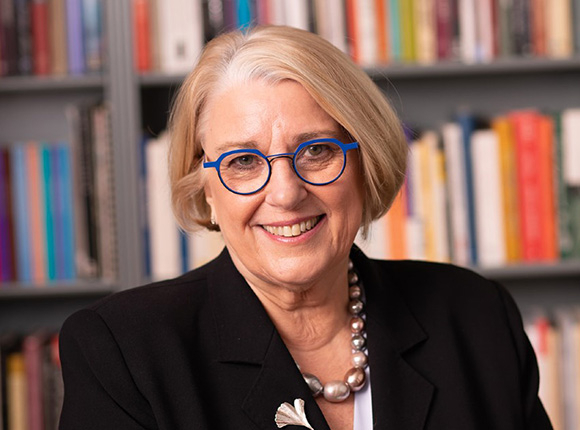The Lucky 13th Presidency

Sonya Stephens was officially inaugurated as the president of AUP last Thursday at the American Church in Paris, making her the 13th president AUP has had in its more than 60 year history. Those in attendance were well aware of any superstition surrounding Stephen’s role as the 13th president, but attendees dismissed the unfortunate history of the number for ideas of optimism and hope for Stephen’s upcoming term. “I am honored to welcome you to AUP as our lucky 13th university president,” said Jacqueline Routier, an alumna from AUP's class of 1994, during her speech.
With the new presidency officially kicked off, Stephens now finds herself lucky enough to be coming into a moment of immense change at AUP, presenting her ample opportunity to show just what she can do for the university.
Coming out of a tumultuous two years of crisis management and adapting to new circumstances, AUP is tasked with the intimidating feat of finding– and reimagining– its identity. Even now, a year after fully returning to in-person classes, the university struggles with re-establishing life as AUP knew it for the newest classes of students who have yet to see the extent of the student culture. However, students are steadfastly moving towards rebuilding what it once was; the events committee, for one, has made its return to campus, and multiple events have already been held.
AUP also just admitted its largest first-year class ever, with over 600 students having entered the university this fall. The effects of the change have been immediate, leaving student spaces on campus increasingly crowded, a housing crisis which has left some first-years without university-sponsored accommodation, and other administrative and technical challenges. With Stephens taking the helm, students are hoping she will be able to handle the unprecedented issues that threaten the quality AUP students’ experience.
At the ceremony, alumni, faculty, staff, and student representatives spoke on behalf of their respective communities to a modest crowd, detailing their praise for Stephens as well as their hope and excitement for the years to come. The proceedings were broken apart by interludes of student performances, integrating an aspect of movement and life into an otherwise relatively subdued ceremony.
“The student performances were amazing, and I think the whole thing was really inspiring,” said Kendall West, a sophomore at AUP and a representative senator for the sophomore class. “It makes me excited to be at AUP. Like, it was really cool to see a lot of the alumni, and just realize that, okay – I could be a part of AUP community for real.”
The theme of listning was a prevalent one through the ceremony, and more specifically, that listening is one of Stephens’s greatest strengths. During the event, students, faculty, and alumni alike praised Stephen for her unique ability to listen to those around her, and to bring forth the ideas of others. Stephens has already established this willingness to listen, sitting down with the Peacock last semester to discuss everything from her love of France to past controversies and mistakes. Sandra Lefaure, former Graduate Student Council president and current grad student, found that this theme of the ceremony especially resonated with her.
“She’s already shown that she is really attached to the student body, and that she is listening to us,” said Sandra Lefaure, a former Graduate Student Council president and current grad student. The theme resonated with her, she said. “I don’t think that many institutions can say that their president is listening to their students, at every level. And I feel like this is what Sonya is doing.”
Stepping in after the presidency of Celeste Schenck, Stephens finds herself with a tough act to follow. In a presidency that saw wide range of achievements, such as the opening of the Quai and Monttessuy buildings, the development of student residential life, and a capital campaign that raised 26 million euros for university, Schenck has left a legacy that will be felt by generations of AUP students for years to come. Today, Stephens said she sees herself in a position in which she can learn from her predecessor and her immense accomplishments for the university; but more importantly, Stephens must now create her own narrative and identity within the greater legacy of AUP.
But at the end of the day, after the pomp and circumstance of the inauguration itself, Stephens said she is ready and excited to officially dive into her presidency. “I think we have to be full of hope,” said Stephens, reflecting on themes of hope and change outlined in the ceremony. “Hope that is not just about optimism, but is really about doing the work that will change the future.”







